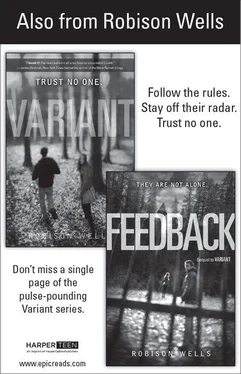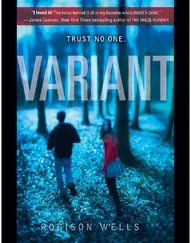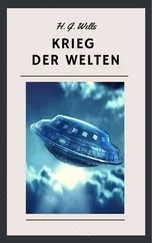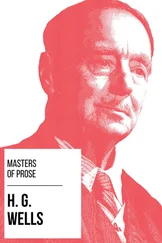“Where should we go?”
“My house, I guess,” he said. “Maybe we can figure out what’s going on.”
Aubrey nodded and turned toward the restroom, its door decorated with crepe paper and a poster-board sign that read “Hotties.” Her hand lingered on it as she pushed the door open.
This was her first dance.
Ten minutes later they were in the field beside the road, trudging through two-foot-tall alfalfa. The rough stalks scratched Aubrey’s ankles and snagged the frills of her dress, but it was ruined anyway.
Aubrey explained everything she’d seen and heard, lying where it was necessary so Jack wouldn’t learn of her invisibility. She said she’d overheard the soldiers checking the students’ identities, seen the soldiers tightening plastic bracelets onto the students’ arms. Jack asked a lot of questions that she had no answers to.
They didn’t dare drive, even though Jack had his truck and Aubrey knew where she could find the keys to Nicole’s convertible Mustang. The plan was to stay off the road, get to Jack’s house, and figure out what was going on. The soldiers had said the students would all be released the next day, and if that was true, Jack said, he’d just turn himself in. Aubrey said she would, too, but it was a lie. She’d disappear. Run. Get as far away as possible.
Where would she go?
“This won’t get out of hand,” Jack said, confidence in his voice. “Name me a house in this town that doesn’t have at least two guns, probably more. Parents aren’t going to let the government lock up their kids.”
Aubrey nodded. She knew it was true of most parents. Her dad . . . well, she’d be lucky if he was sober enough to say good-bye as she was taken away.
“Lake Powell was attacked,” Jack said, and Aubrey stopped.
“When?”
“I don’t know. Today some time. That’s the closest.”
She shook her head. “No. There was that sabotage at Kennecott.” People thought she was dumb—not caring about current events was almost a point of pride among Nicole’s friends—but she was still Aubrey. She still read, even if it was alone, in her room. She still cared.
No, that wasn’t true.
She hated what she knew she’d become. High school would be over soon, and then where would she be? Nicole wouldn’t be around to make her popular anymore, and even though Aubrey could disappear and steal a homecoming dress, that didn’t mean she could shoplift her way into college.
Aubrey had been a straight-A student until she’d become friends with Nicole. Nicole could afford to skip classes and get bad grades—her dad was the richest man in Sanpete County and owned at least half the turkey farms. Nicole would go to college, tuition paid in full, with letters of recommendation coming from the best names in central Utah—mayors, judges, state senators. But Aubrey needed a scholarship, and she was losing it every day, all in exchange for popularity.
“What happened to the lake?” she asked, turning and continuing to walk.
“It sounds like the dam broke,” Jack answered. “I didn’t hear a lot of details.”
She nodded, and they walked in silence for a long time. If only she could talk to Nicole—the one person who knew her secret. At times, their relationship had felt more like a business partnership than a friendship, but they shared the deepest, darkest secret Aubrey could imagine—that she was wrong . Defective. So different that she wondered if she was human at all.
At first Nicole had joked that it was a miracle, that Aubrey was some angel sent to earth to do good works and fight crime. But it hadn’t turned out that way. Not only was she a criminal, but her anomalies didn’t end with invisibility. Her eyesight was getting bad—and not just something glasses would fix. Sometimes she couldn’t see at all.
And the headaches were almost constant.
There wasn’t a day that went by that she didn’t wonder if she wasn’t dying of a brain tumor.
But the one time she’d gone to the clinic her dad had been there within hours to yank her away, and yell at the receptionists and doctors—and Aubrey—for unnecessary medical care. She knew he wasn’t paying any of the bills they’d sent. He’d never even opened them; they just piled up by the door next to the rest of the mail that she wished he’d look at.
A brilliant white light burst on, less than a hundred yards away. Jack and Aubrey both dropped to their knees, and she went even farther, flattening herself in between a row of the crops. She instinctively started to disappear before she stopped herself.
“It’s not a military truck,” Jack said quietly.
Aubrey lifted her head enough to see the light. When it was pointed away from them, she could see someone standing in the back of a pickup.
“Maybe they’re trying to find us?” she said hopefully. Jack was right—most of this town wouldn’t stand for the kidnapping of their kids.
“No,” Jack said. “Look how it’s parked.”
She strained to see, but to her it just looked like the outline of a pickup.
The beam flashed toward them again and she ducked.
“It’s sideways,” Jack said. “Like a roadblock.”
He was right. Whoever was in the pickup was scanning a handheld halogen lamp back and forth across the field, blocking the one and only road to the barn.
The light hit the cab of the truck briefly, illuminating the man for an instant.
“He’s got a rifle,” Aubrey said, suddenly chilled despite the heavy sheepskin coat.
“It’s Lance Halladay.” Aubrey could hear the disgust in Jack’s voice. “I bet Ian Morris is with him.”
Lance and Ian were two people who made Mount Pleasant a little less pleasant. They were only a couple of years older than Aubrey and Jack, and probably would have been in jail if it wasn’t a small town with a lenient police force. No big crimes, just a lot of public drunkenness and loitering. A ton of ogling and harassment, if that was illegal. Aubrey didn’t know, and the police didn’t seem to care.
“I don’t think we should go this way,” Aubrey said. The boys weren’t out there to help straggling kids. They were there for . . . she didn’t know. The one thing Aubrey knew was that she was somehow like Nate Butler, and he’d been killed.
“I think you’re right.”
They backed out of the field, crawling on their hands and knees through the harvest-ready crops until they felt they were far enough away. Aubrey stood, feeling weaker than ever. Normally she would only stay invisible for a few minutes—fifteen at the most. Tonight, she’d spied for at least twenty-five, and then she’d hidden from the soldiers on and off for another hour as they swept the area for runaways.
But there was nothing she could do about it now. Her only other option was to sit down on a rock and wait for someone to find her.
“What if we just turn ourselves in?” Jack asked. “You told me the soldiers said this was for our own safety.”
“No,” she answered firmly.
He nodded, and Aubrey wondered what he was thinking. They used to be so close. She used to be able to read him like a book. That was less than a year ago, but it felt like a decade.
They crossed two more long fields, her dress snagging on barbed wire when she climbed both fences. Each time it made her want to cry—the dress had been gorgeous, the prettiest thing she’d ever owned. Stolen.
“Do you hear that?” Jack asked, stopping and grabbing her arm.
Aubrey listened, straining to hear anything besides the cold canyon wind. “What?”
“Voices,” he said, and then carefully climbed up the short embankment to the road. He ducked, and pointed.
Aubrey was right behind him, and saw the shapes in the distance—three cars across this road. None had their lights on; instead, half a dozen flashlights moved violently around the makeshift roadblock.
Читать дальше












